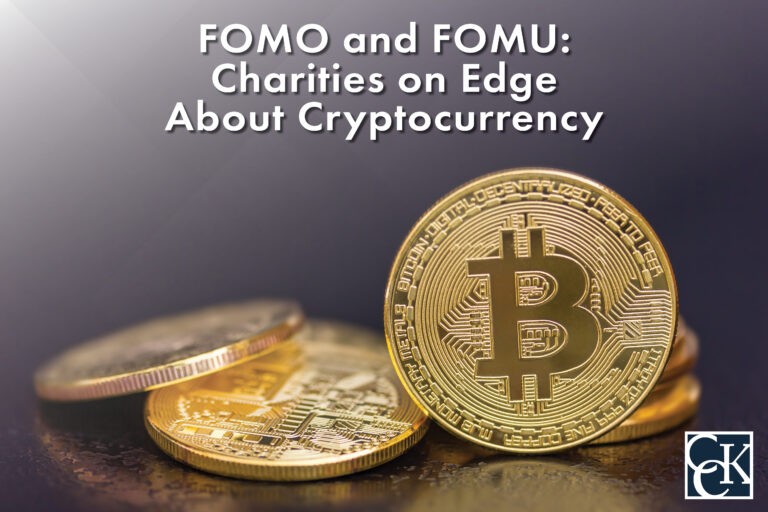FOMO and FOMU: Charities on Edge About Cryptocurrency

It does not take a crystal ball to prognosticate that cryptocurrency gifts will have an increasing role in fundraising for many years. The amount of wealth represented by this asset type continues to mushroom, and fiduciaries report a steady rise in crypto gifts and bequests.
The charitable world is decidedly split on the wisdom of accepting contributions in this relatively new currency. At one extreme, some organizations have scrambled to ramp up the cultivation of these gifts. In many of these cases, one can discern the all-too-human emotion of FOMO (Fear of Missing Out).
On the other hand, there are charities that have been cautious, even suspicious, when it comes to such contributions. In these, we see a strong streak of FOMU (Fear of Messing Up). Who is right? Who is wrong? The reader will not find that answer in this posting.
Indeed, a single answer likely does not exist. What we can offer are some reflections on some of the primary drivers of FOMO and FOMU. Hopefully, these musings may help some of our colleagues in the nonprofit community think through the crypto issue and arrive at a comfortable place for their charity.
Can’t an Organization Just Handle This on an Ad Hoc Basis?
Sure, every case presents its own peculiar facts. However, there are some overarching principles that an organization might want to adopt in order to have a consistent approach to the crypto question and to avoid reinventing the wheel every time such a gift is offered.
These principles would ideally be incorporated into a gift acceptance policy. As CCK has pointed out in another post, the gift acceptance policy can be very useful in repairing frayed relations with a donor whose gift is rejected. The blow of rejection can often be softened by “blaming” a policy, thereby negating any thought that the refusal was personal to a particular supporter.
Why Wouldn’t an Organization Take a Crypto Donation? Cryptocurrency Is Incredibly Valuable.
There are thousands of different cryptocurrencies. Price fluctuations in a few, like Bitcoin and Ethereum, have created and destroyed fortunes overnight. Charities that accepted Bitcoin, for example, in its early days and held the investment have seen extraordinary and jaw-dropping gains.
For every Bitcoin, there are hundreds of cryptocurrencies that are, and will always be, virtually worthless. Many of these currencies are priced at a small fraction of a penny per unit. A charity interested in accepting meaningful donations of virtual currency probably needs to set some parameters in the form of ground rules for evaluating proffered gifts.
We’ve All Read About Cryptos That Went “Bust” Overnight. Why Would a Charity Accept That?
The incredible volatility of cryptocurrency may be a reason not to invest in these assets. It is less apparent that it is a substantial reason to refuse a freely offered donation. Stocks can nosedive, oil wells dry up, and businesses fail. Those possibilities do not usually deter charities from accepting them as gifts. It is hard to see why the same logic does not apply to substantial cryptocurrencies.
But With Such Volatility – Not to Mention the Unusual Nature of Virtual Currencies – How Can We Give the Donor an Accurate Receipt for the Gift? Aren’t We Sticking Our Necks Out by Placing a Value on It?
Great question. This is a non-problem. The IRS considers donated cryptocurrency to be “property.” As with other property, a donation worth $5,000 or more must be accompanied by a “qualified appraisal.” Obtaining the appraisal is the responsibility of the donor, not the charity. In issuing a receipt, the charity need only describe the gift (e.g., “one Bitcoin”), but not value it. CCK is aware that obtaining a qualified appraisal of cryptocurrency gifts can be a challenge.
We Have No Idea How to Accept Cryptocurrency, Hold It, and Sell It (or Decide When to Sell It). For That Reason, We Want to No Part of It.
Again, a non-problem. If the mechanics of acceptance and sale are the reason for declining a gift, charities might consider utilizing one of a growing number of donor-advised funds that are willing to act as the donee for crypto-gifts, ultimately passing them along to the intended charity but in standard currency.
We Have Heard That Some Charities Decline Crypto Gifts Because of Ethical or Moral Considerations. What Is That All About?
You’ve heard correctly. Although we cannot evaluate the ethical status of the virtual currency market, two concerns are frequently cited. One is that the crypto industry runs to some extent on what might be called “competitive computing.” This activity reportedly uses an enormous amount of energy. For this reason, some charities, especially those with an environmental mission, have declined these gifts.
A second, broader, ethical concern has also surfaced. Some economists and financial experts have likened the cryptocurrency world to an elaborate Ponzi scheme that enriches those who entered the fray early and fleeces the later arrivals in the process.
CCK cannot evaluate the claim(s) that the virtual currency world rests on a shaky ethical foundation. Charities concerned about the issues raised should evaluate the pertinent literature when addressing cryptocurrency in the context of a gift acceptance policy
